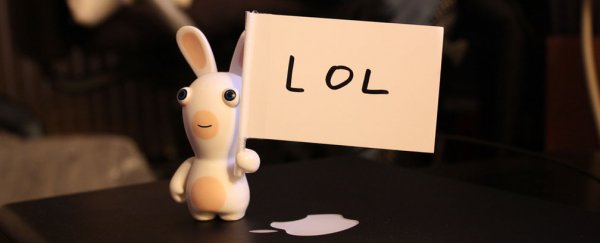The way that human languages evolve is an area of continual interest for scientific researchers, and the explosion of online communication in the information age gives rise to arguably the richest body of data ever recorded for linguists to explore and analyse.
Now a new Facebook study of the way we express laughter in social media shows that 'e-laughter', much like any other human dialect, is evolving with the times. Researchers from the company's Core Data Science team pulled apart the way we show our amusement online and came up with some interesting conclusions. Amongst these is the revelation that LOL – the 'laugh out loud' acronym that's become virtually synonymous with digital speech – appears to be an endangered expression.
The team analysed Facebook posts and comments from the last week of May that contained strings of characters matching laughter, including variants of haha, hehe, emoji, and LOL. They found that expressions of laughter are unsurprisingly common online, with 15 percent of people using some form of e-laugh in their posts and comments. Of those, most people only laugh once per week (46 percent), and 85 percent of people post fewer than five laughter expressions in a week.
Most of us stick to just one kind of e-laugh (52 percent), while about 20 percent of people will use two different types. The most common e-laugh is haha (51.4 percent), followed by the use of emoji (33.7 percent), hehe (13.1 percent), and finally LOL with just 1.9 percent of e-laughs.
Breaking down the laughter expressions by age reveals that LOL is an outlier yet again. While the median age for all people using e-laughs is between 20 and 30 years old, LOL-ers are noticeably the oldest group, with a median in the late twenties; emoji users are the youngest; and people saying haha and hehe are somewhere in between.
The revelation that LOL is dead and only used by older people – likened to "basically decrepit technology dinosaurs with very little idea of what's going on in the culture of today" by one writer – has been met with some amusing commentary online. According to Caroline Davies of The Guardian, the first nail in LOL's coffin was when it gained mainstream legitimacy by being included in the 2011 Oxford English Dictionary, followed shortly after by this shocking ignominy:
LOL was to suffer an even worse blow in 2012, when it emerged that David Cameron had taken to tapping it into his smartphone – albeit in the mistaken belief it stood for "lots of love".
But is it any surprise that LOL is on the way out? Perhaps not. Unlike the other forms of e-laughter looked at by Facebook in its analysis, LOL is not just an expression of amusement – it's also an abbreviation used in the economical 'txt-speak'. Stemming from an age before social media where people who used SMS messaging and basic online chat were limited to short missives and text-only characters, txt-speak popularised the use of abbreviations and slang to let people get their message across in more efficient ways.
With newer, less restrictive ways of expressing ourselves now thanks to contemporary technology and social media, LOL doesn't have quite the cachet it once did. A little sad maybe, but that's the way it goes when language, culture, and technology evolve alongside one together.
